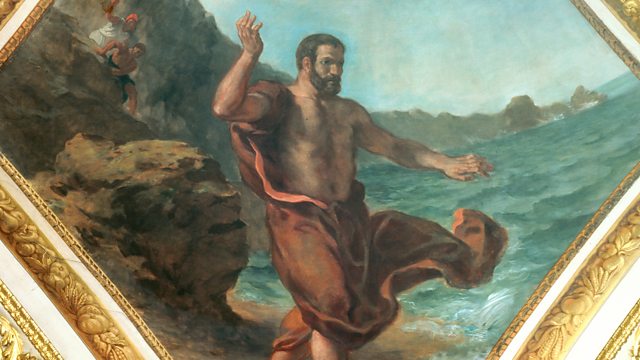Demosthenes' Philippics
Melvyn Bragg and guests discuss the ferocious speeches Demosthenes gave to stir up his fellow Athenians against their enemy Philip II of Macedon and so abandon appeasement.
Melvyn Bragg and guests discuss the speeches that became a byword for fierce attacks on political opponents. It was in the 4th century BC, in Athens, that Demosthenes delivered these speeches against the tyrant Philip II of Macedon, father of Alexander the Great, when Philip appeared a growing threat to Athens and its allies and Demosthenes feared his fellow citizens were set on appeasement. In what became known as The Philippics, Demosthenes tried to persuade Athenians to act against Macedon before it was too late; eventually he succeeded in stirring them, even if the Macedonians later prevailed. For these speeches prompting resistance, Demosthenes became famous as one of the Athenian democracy’s greatest freedom fighters. Later, in Rome, Cicero's attacks on Mark Antony were styled on Demosthenes and these too became known as Philippics.
The image above is painted on the dome of the library of the National Assembly, Paris and is by Eugene Delacroix (1798-1863). It depicts Demosthenes haranguing the waves of the sea as a way of strengthening his voice for his speeches.
With
Paul Cartledge
A. G. Leventis Senior Research Fellow at Clare College, University of Cambridge
Kathryn Tempest
Reader in Latin Literature and Roman History at the University of Roehampton
And
Jon Hesk
Reader in Greek and Classical Studies at the University of St Andrews
Producer: Simon Tillotson
Last on
More episodes
Previous
LINKS AND FURTHER READING
READING LIST
Demosthenes (ed. J. Herrman), Selected Political Speeches (Cambridge University Press, 2019)
Demosthenes (trans. Robin Waterfield), Demosthenes’ Selected Speeches (Oxford University Press, 2014)
Demosthenes (ed. H. Yunis), On The Crown (Cambridge University Press, 2001)
Mogens Herman Hansen, Athenian Democracy in the Age of Demosthenes (Bristol Classical Press, 1998)
Peter Hunt, War, Peace, and Alliance in Demosthenes' Athens (Cambridge University Press, 2010)
Polly Low, Interstate Relations in Classical Greece: Morality and Power (Cambridge University Press, 2007)
Douglas M. MacDowell, Demosthenes the Orator (Oxford University Press, 2009)
Gottfried Mader, ‘Foresight, Hindsight, and the Rhetoric of Self-Fashioning in Demosthenes' Philippic Cycle’ (Rhetorica 1, November 2007)
Gunther Martin (ed.), The Oxford Handbook of Demosthenes (Oxford University Press, 2019)
Robin Osborne, Athens and Athenian Democracy (Cambridge University Press, 2014)
Plutarch (trans. R. Waterfield), Hellenistic Lives (Oxford University Press, 2016)
Plutarch (trans. Andrew Lintott), Demosthenes and Cicero (Oxford University Press, 2013)
Jeremy Trevett, Demosthenes, Speeches 1-17. The Oratory of Classical Greece (University of Texas Press, 2011)
Ian Worthington, Demosthenes of Athens and the Fall of Classical Greece (Oxford University Press, 2013)
Ian Worthington (ed.), Demosthenes: Statesman and Orator (Routledge, 2000)
RELATED LINKS
Broadcasts
- Thu 17 Nov 2022 09:00�鶹�� Radio 4
- Thu 17 Nov 2022 21:30�鶹�� Radio 4
Featured in...
![]()
Ancient Greece—In Our Time
Browse the Ancient Greece era within the In Our Time archive.
![]()
History—In Our Time
Historical themes, events and key individuals from Akhenaten to Xenophon.
In Our Time podcasts
Download programmes from the huge In Our Time archive.
The In Our Time Listeners' Top 10
If you’re new to In Our Time, this is a good place to start.
Arts and Ideas podcast
Download the best of Radio 3's Free Thinking programme.
Podcast
-
![]()
In Our Time
Melvyn Bragg and guests discuss the ideas, people and events that have shaped our world.



